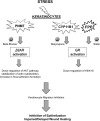Stress-Induced Hormones Cortisol and Epinephrine Impair Wound Epithelization
- PMID: 24527275
- PMCID: PMC3623592
- DOI: 10.1089/wound.2011.0320
Stress-Induced Hormones Cortisol and Epinephrine Impair Wound Epithelization
Abstract
Background: Stress-induced disruption of hormonal balance in animals and humans has a detrimental effect on wound healing.
The problem: After the injury, keratinocytes migrate over the wound bed to repair a wound. However, their nonmigratory phenotype plays a role in pathogenesis of chronic wounds. Despite many therapeutic approaches, there is a dearth of treatments targeting the molecular mechanisms mediated by stress that prevent epithelization.
Basic/clinical science advances: Recent studies show that epidermal keratinocytes synthesize stress hormones. During acute wound healing, cortisol synthesis in the epidermis is tightly controlled. Further, a key intermediate molecule in the cholesterol synthesis pathway, farnesyl pyrophosphate (FPP), can bind glucocorticoid receptor (GR) and activate GR. Additionally, keratinocytes express beta-2-adrenergic-receptor (β2AR), a receptor for the stress hormone epinephrine. Importantly, migratory rates of keratinocytes are reduced by cortisol, FPP, epinephrine, and other β2AR agonists, thus indicating their role in the inhibition of epithelization. Topical inhibition of local glucocorticoid and FPP synthesis, as well as treatment with β2AR antagonists promotes wound epithelization.
Clinical care relevance: Modulation of local stress hormone production may represent an important therapeutic target for wound healing disorders. Topical administration of inhibitors of cortisol synthesis, statins, β2AR antagonists, and systemic beta-blockers can decrease cortisol synthesis, FPP, and epinephrine levels, respectively, thus restoring keratinocyte migration capacity. These treatment modalities could represent a novel therapeutic approach for wound healing disorders.
Conclusion: Attenuation of the local stress-induced hormonal imbalance in epidermis may advance therapeutic modalities, thereby leading to enhanced epithelization and improved wound healing.
References
Publication types
LinkOut - more resources
Full Text Sources
Other Literature Sources



